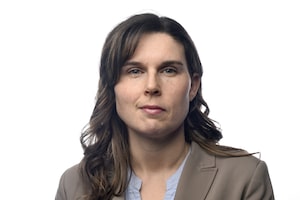Tanya Foley is pictured on Saturday April 16, 2011, at the Deutweg Ice Hall in Winterthur, Switzerland. The International Ice Hockey Federation wants Foley to grow women's hockey on a much larger scale. THE CANADIAN PRESS/ Donna SpencerDonna Spencer/The Canadian Press
As women's hockey teams from all over the world confide in Tanya Foley about the cultural or financial challenges that are holding them back, she often finds herself saying, "You are not alone."
Hired by the International Ice Hockey Federation five months ago as its first manager of women's hockey, the 37-year-old Edmonton native has been given the task of making the women's international game more competitive by helping struggling nations.
She hears about federations who give most of their funding to the men and teams that can't afford to travel. They tell her how low enrolment by girls hurts the growth of national teams, and about the all-too-common stereotype that women can't be high-performance athletes, especially if they want to have a family.
Foley grew up loving hockey, idolizing Wayne Gretzky in the Edmonton Oilers heyday and organizing a girls' league after being told she couldn't play with the boys. She played and coached at the University of British Columbia and worked for the committee that organized the 2010 Winter Olympics last year in Vancouver as a manager of hockey.
Today, she is in charge of a $2.1-million, four-year improvement project leading up to the 2014 Olympics in Sochi, Russia, full of initiatives that are already pushing national federations to pony up more resources and communicate with other countries to find solutions.
"I get asked all the time, 'Is it even possible to make women's hockey viable on the world scene?'" Foley said from Zurich, Switzerland, where she has moved with her husband to take the job at the IIHF headquarters. "Coming out of Vancouver, we feel now is the time to strike, but it's important that this year's programs succeed."
Foley's appointment was made in the wake of a stern warning by International Olympic Committee president Jacques Rogge that the sport would be dropped from the Winter Olympics if parity doesn't improve. There's a large gap in calibre between Canada, the United States and the next two teams, Sweden and Finland, then another huge gap between the next group of teams.
"Everyone agrees [there is a discrepancy]" Rogge said. "This may be the investment period for women's ice hockey. I would personally give them more time to grow but there must be a period of improvement. We cannot continue without improvement."
At the women's world championships in Zurich last month, Foley helped organize the IIHF's first women's coaching symposium, and delegates from 26 nations attended. Canadian and U.S. coaches shared advice on the differences between coaching men and women, while speakers from France, Sweden and the Czech Republic spoke about cultural problems they face.
"We were thrilled to see that 95 per cent were from Europe, and they had never had a chance to go to any coaching symposium let alone one just for coaching women," Foley said. "They were so excited to walk across the room and get a phone number or an e-mail of someone who can help them learn."
Foley doesn't expect big strides by the 2014 Olympics; change will be slow. But she has seen progress. Russia made the bronze-medal game at the recent worlds, France plans to centralize its team, the Czechs are starting a big ad campaign to improve the visibility of their players, and Sweden has hired Erika Holst, its most famous female player, as its first manager of women's hockey.
"It was hard for the IIHF to ask the national federations to go hire someone to be in charge of women's hockey in their countries when they didn't have someone in charge of it in their association," said Holst, who played for Sweden at nine worlds and won two Olympic medals. "But now they have Tanya Foley, and it has sent a big message."
The next project is a mentor program that will pair athlete ambassadors and coaches from the top four countries - Canada, the United States, Sweden and Finland - with the bottom 10 for camps and constant tutoring over the next three years.
"The mentors are as excited to be involved as the nations receiving the help," said Foley, who hasn't yet released the names of the well-known athlete mentors. "These are the best of the best. I'm lucky to be in the same room as some of these people."
There will also be a high-performance camp for all countries this July in Slovakia, and Foley said she hasn't heard any hesitation from federations about spending the money to send their players and staff.
"The fact that the IIHF hired a female manager at this level has never been done before, and federations have someone to turn to now," said four-time Olympic medalist Hayley Wickenheiser, of Calgary. "What people don't realize is that in many countries, the best female players in the nation are the young ones, so federations have to do everything they can to help them develop."
 Rachel Brady
Rachel Brady